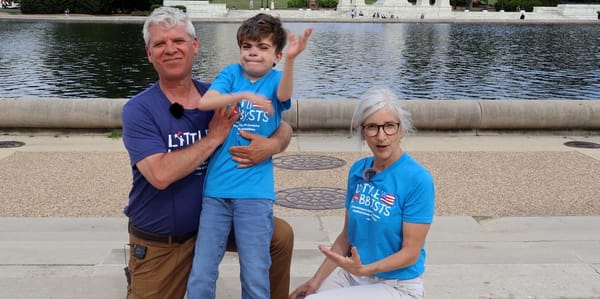
Charlie's Story: Medicaid Builds A Future for Medically Complex Children
Charlie's Medicaid and access to home and community based services gives him the best quality of life, and future.

Charlie's Medicaid and access to home and community based services gives him the best quality of life, and future.
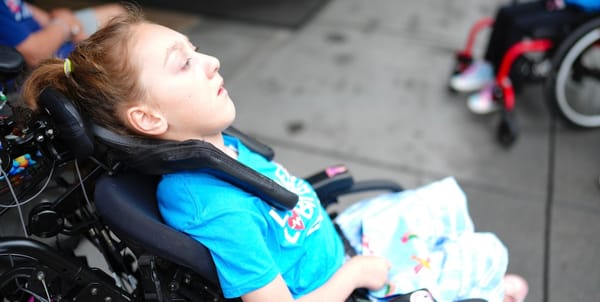
Julie and her family relocated to Missouri from their home state of Arkansas to access better care for their daughter Olive.
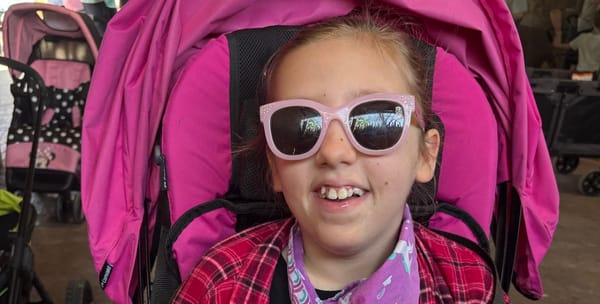
Without Medicaid, Audrey could become a ward of the state, instead of at home with people who love her.
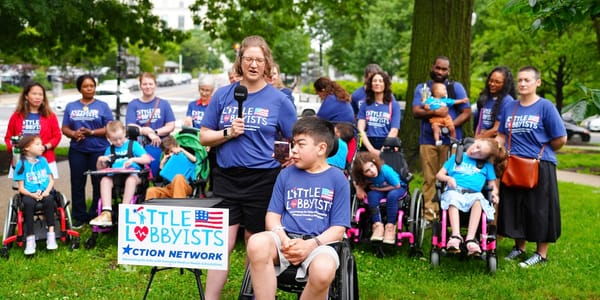
Our close-knit Alaskan community knows it takes a village — and Medicaid — to raise a child.
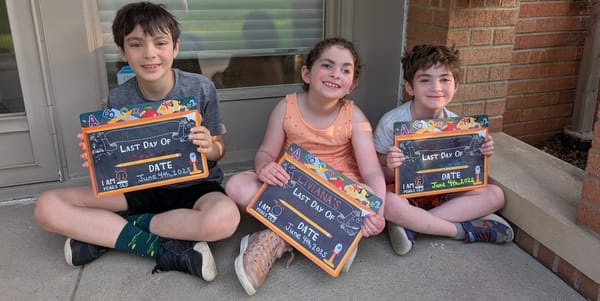
When a tree branch fell on our daughter Liviana's head, she became a totally different person. Medicaid was there for her in her time of need.
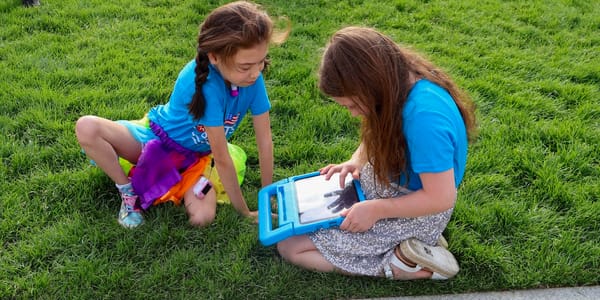
Rural hospitals across the U.S. count on Medicaid and Medicare funding to keep their doors open. Without Medicaid, these facilities could close.
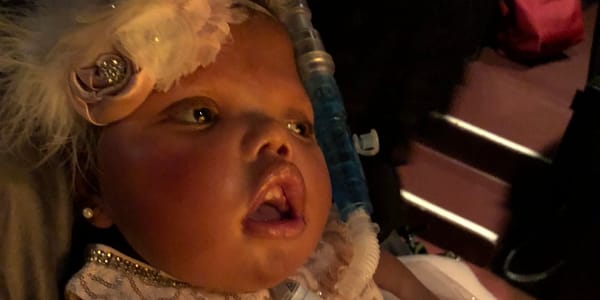
The Children's Center at the University of Southern Mississippi values medically complex children as people and provided my daughter Ansley with the best quality of life.
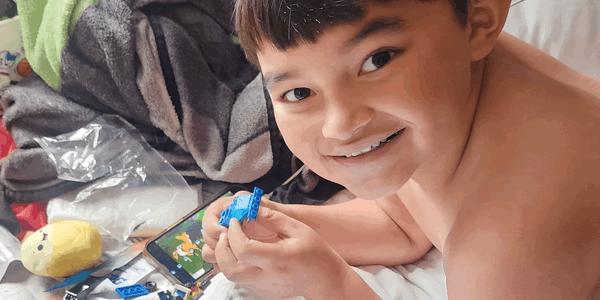
The Medicaid Health Insurance Premium Payment Program backs up our private insurance to keep Ian safe and thriving.
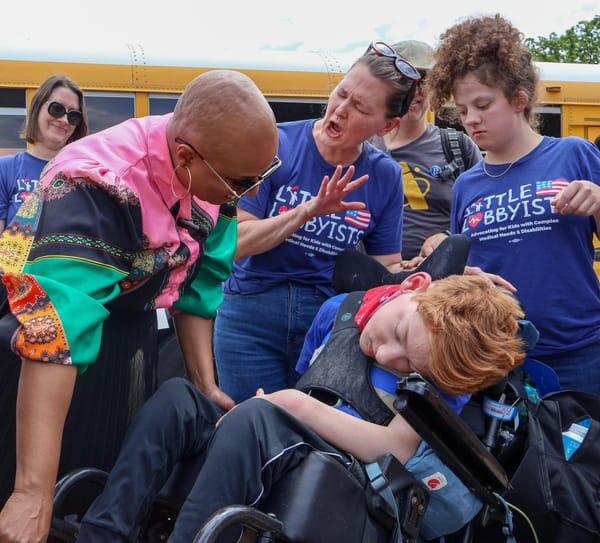
Trump's first hundred days are threatening medical research; critical programs children and families rely upon for survival; and continued access to medical supplies, equipment, and medications.
There was a time while I was caring for Adonise as an infant in the NICU when people tried to apologize for things they did not understand about my son. The unknown and the undescribed. He spent 361 days in the neonatal intensive care unit (NICU), where he received a
Hi! I’m Jenny McLelland and I’m the Director of Policy for Home and Community-Based Services for Little Lobbyists. My family lives in Clovis, a small city in the agricultural Central Valley of California. My husband is a physical education teacher, and I’m a retired police officer. We
On August 26, 2024, the Care Can’t Wait bus tour kicked off its first event in Chicago, Illinois. "Care on Tour" would wend its way through nine cities in seven states. It was part of an ongoing national campaign by the Care Coalition that highlights the importance
A few weeks ago, I sat in a room in the White House, surrounded by disabled advocates, and listened to a man named Mychal Threets speak about library joy. He was a panelist at the event, the White House Disability Pride Convening I’d seen Mychal on TikTok before as
My son Adonise is a second-generation Haitian-American who has a teacher and a technology professional for parents. Adonise is curious, rambunctious, funny, and intelligent. He’s a budding drummer, and he loves the playground and to wave the Haitian flag every morning. We call him Donnie, but I call him
This spring, PBS aired Understanding Autism, a documentary by filmmaker Scott Steindorff, who was diagnosed with autism as an adult. Steindorff wants to reframe the conversation about autism by focusing on the incredible talents and personalities of autistic people. The film is a rewarding and refreshing look at neurodiversity. Little
In July, the Care Can’t Wait Coalition sponsored several events on community integration in Washington, DC, including a panel at the White House, a Congressional briefing, and a Summit at the Martin Luther King, Jr. Memorial Library. Community integration is at the heart of disability rights, and is supported
Did you know that the Civil Rights Act of 1964 does not ensure civil rights for people with disabilities? The Act “outlaws discrimination based on race, color, religion, sex and national origin.” The Civil Rights Act does not outlaw discrimination based on disability. So how then are people with disabilities
Today, June 22, 2024, marks the 25th anniversary of the U.S. Supreme Court’s landmark case, Olmstead vs. L.C., which affirms the right of disabled people to use their state Medicaid benefits to live in their communities, rather than in institutions. The suit was brought by Lois Curtis
The U.S. Supreme Court’s Olmstead Decision, a landmark civil rights case for people with disabilities, marks its 25th anniversary this year! In 1999, the Court upheld the right to community integration in the Americans with Disabilities Act (ADA) of 1990. Our disabled loved ones have the right to
“By removing barriers to health care and social services, this rule advances justice for people with disabilities who have for too long been subject to discrimination. No diagnosis should be missed because of an inaccessible mammogram, no patient should be left with questions about test results due to inaccessible websites,
Kelley Coleman is the mom to two amazing boys, one of whom has multiple disabilities (including an as-yet-undiagnosed genetic syndrome, cerebral palsy, autism, CVI, epilepsy, and more). Her book Everything No One Tells You About Parenting a Disabled Child: Your Guide to the Essential Systems, Services, and Supports stems from
Ady Barkan, health care activist and co-founder of Be A Hero, passed away from complications of ALS on 11/1/23. This tribute is adapted from remarks delivered at CareFest in Los Angeles on 11/2/23. Like so many who loved him, when I think of Ady, I think
(Editor's note: edited and republished on 5/13/2025) This week marks the 50th anniversary of the Rehabilitation Act of 1973, which opened doors to jobs, education, independent living, and much more for people with disabilities. The Act also established standards for accessible communication and information technology. The
This time of year brings back lots of memories of family vacations. Cerebral palsy means that accessibility is a priority on vacation. Our family enjoyed trips to Cape Cod, Maine, and New Jersey when I was growing up. Planning an accessible vacation can be challenging, but it is possible. Finding
This week, the disability community lost a great light. Judy Heumann has been called the mother of the disability rights movement, and her life reflected that. She was kind, warm, encouraging to Little Lobbyists families, and, especially to our children. Her own family, as described in her memoir, Being Heumann:
I can still remember our family’s first encounter with disaster preparedness–or lack thereof–it was the day of 9/11, 2001, and my son Rob was four years old. My husband and I had waved him off to preschool on that beautiful, bright blue morning at our home
Families like ours are nothing if not prepared. As a mom and caregiver to my Little Lobbyists, Emma and Sara Bean, I have plans on top of plans. Emergency Action Plans (EAPs) are a lifesaving requirement for our homes and our schools. Our families have checklists, “go bags” and contingencies.
On June 22, 1999, when the U.S. Supreme Court issued its landmark disability rights decision in the case of Olmstead vs. L.C. & E.W., my family was at the beginning of our own disability rights journey. My son Rob had just turned two, and we were struggling
Our children with complex medical needs and disabilities will grow up to become adults with disabilities, so it’s important that we, as Little Lobbyists families, listen to disabled adults. Those of us who are parents may not have experienced life with a disability until our child did—who better
My son Rob is a 25-year-old artist and activist. He’s survived and thrived in his community because he has had access to enteral (or “tube”) feeding for all of his nutrition, hydration, and medication needs since the age of two. Tube feeding isn’t shameful; it’s just another
“Hey there”, my email to our enteral supplier began in as friendly a tone as I could muster, “We received my son’s tube-feeding supplies and after his home health aide went to hang one of the bags, she realized that the wrong feeding bags were sent. We usually get
I’ve had some reasons for optimism about the pandemic, including the development of vaccines and treatments, but my community is still in danger, and it seems that nondisabled folks care less and less. I can remember the early days of the pandemic, thinking that nondisabled people might finally understand
Adulthood is a challenging time for most young adults and their families. For adults with disabilities and their parents, it’s extra challenging. As an adult with Cerebral Palsy, adulthood has been more challenging than I’d imagined. Luckily, my parents have been supportive. I am lucky to have a
(Editor's note: edited and republished on 5/13/2025) Rob Stone is an active member of Little Lobbyists. Rob’s goals upon leaving high school were to become a health care and disability rights advocate, and an artist with his own art website. Rob has a rare disease,
Little Lobbyists honors the passing of an advocate who changed our children’s lives: Julie Beckett, the mother of Katie Beckett, for whom a crucial Medicaid waiver is named. Julie and Katie Beckett became advocates for people with disabilities because they wanted justice and a good life for Katie and
We find ourselves celebrating our third consecutive World Down Syndrome Day (WDSD) against the backdrop of a global pandemic; though, undeniably, something has recently shifted. While much of the world, and certainly much of the United States, has decided that it is time to turn the page, close the book,
As the mother of a medically complex child, I was stunned by a recent Facebook post by a scientist friend who is cautiously advocating for dropping mask requirements in schools. He’s posted the recently released “Urgency to Normal” toolkit. My friend reminds us that he “was all-in at the
Disability Day of Mourning is an annual commemoration held on March 1st to remember the lives of people with disabilities murdered by their caregivers, particularly those killed by parents and other family members, and to demand justice for their deaths. Our executive director, Elena Hung, spoke at today’s vigil
Self-directed or consumer-directed services are an increasingly popular option among state Home and Community-Based Services (HCBS) waivers. The Self-Directed Advocacy Network of Maryland, Inc., (SDAN) calls self-direction, “Living the life you want.” Jeneva interviewed Alicia Wopat, President of SDAN, to learn more about the group’s advocacy. Tell me about
What happens to disabled young adults after high school? Many families don’t know what to expect when school ends. The Individuals with Disabilities Education Act (IDEA) makes education an entitlement for students with disabilities, ensuring them a place in their communities. However, families quickly learn as high school draws
Share the Journey with Jeneva: Sherry Pickett Gets to the “Heart” of Advocacy Sherry Pickett has a Master’s Degree in Education, specializing in mental health. She’s worked in the mental health field for the last 18 years, providing Case Management Services and Therapy/Parenting Classes. Now her career
(Editor's note: edited and republished on 5/13/2025) In 1981, President Ronald Reagan learned about a 3-year-old girl with complex medical needs and disabilities named Katie, who was forced to live in an institution because federal rules governing Medicaid prevented her from getting the care she needed
September 24th felt like an eternity away. September 24th was my daughter Myka’s 12th birthday. We began counting down to her big day the minute the CDC, last May, approved Covid-19 vaccines for kids 12 and up. Myka, the youngest of my three kids, is the only unvaccinated person
I’ve been thinking about trauma lately. Our children and our families have been through so much over the last year and a half--not only the pandemic itself, but the insurrection at the U.S. Capitol; the natural disasters caused by climate change; the U.S. withdrawal from Afghanistan; the
Joyful, silly, and smart are words my husband and I would use to describe our six-year-old son. He is a child who knows no stranger, genuinely loves everyone he comes across, and is obsessed with cars. The world is his oyster, and he loves being an active participant in life!
I still remember my first event with Little Lobbyists, a family-led group advocating for kids with complex medical needs and disabilities. My son Rob wasn’t with me that day--he was enjoying one of his last precious days of public school, which he loved. I’d gone to Capitol Hill
On Thursday, June 17, 2021, the U.S. Supreme Court upheld the Affordable Care Act (ACA), and I breathed a huge sigh of relief. I've lost count of how many times I have metaphorically held my breath while waiting to find out if the ACA, which ensures my
Given the Biden Administration’s commitment to Home and Community-Based Services (HCBS) and ending Medicaid waitlists, our country will need more and better-trained direct care workers. These home care workers will be vital to the ability of our medically complex and disabled children to survive and thrive in their communities.
On June 17, 2021, the U.S. Supreme Court issued a decision on a group of cases from several states that challenged the constitutionality of the Affordable Care Act (ACA). The Supreme Court ruled 7-2 that the plaintiffs lacked standing to challenge the health care law. This was the third
This morning’s ruling by the Supreme Court upholding the Affordable Care Act is a victory for our children with complex medical needs and disabilities and for all Americans. The Affordable Care Act (ACA) has saved and improved the lives of our children with complex medical needs and disabilities with
The CDC just recently lifted the mask mandate for those of us who have been fully vaccinated. Hurray! The moment we all waited for, right? Except that for some of us, our medically-complex, under-12-year-old children are still at risk every day in this Covid-19 world. We trusted the school districts
Jeneva Stone has the honor of interviewing Angela N. Weddle, a professional visual artist who is autistic with cerebral palsy and congenital right hemisphere brain damage. Weddle is a neurological anomaly and savant, who is not supposed to have any artistic ability but always has. Weddle has mentored and taught
With vaccines on the horizon for teens and younger children this summer and fall, the end of the pandemic may be close enough to grasp. How will you seize the moment as an advocate? These last weeks, I’ve been reflecting on my own plunge into state and federal advocacy,
As parents of children and young adults with disabilities, we should always work to be better allies. Being an ally means empowering our kids and asking ourselves some challenging questions: Are we letting our children speak for themselves? Are we giving them the means and the platform to become their
Maya Brown-Zimmerman is an adult with a rare genetic disorder, parenting four kids with medical needs themselves. When she’s not handling school stuff, driving people to doctor and therapy appointments, taking classes herself (working towards a goal of a Masters in Genetic Counseling), and doing advocacy work within the
I first heard Sister Simone speak at the Women’s March in Washington D.C. on January 21, 2017. Like many people on that unseasonably warm winter day, I’d never been to a protest march before. I was unsure what to expect, and uncertain if I belonged. As I
We must end police violence against Black Americans, and against all people of color, and people with disabilities. The U.S. House of Representatives recently passed the George Floyd Justice in Policing Bill of 2021, which, if enacted, would ban chokeholds and end qualified immunity for police officers. Police violence
Nathan Spoon is an autistic poet with learning disabilities whose poems and essays appear or are forthcoming in American Poetry Review, Columbia Journal, The Cortland Review, Gulf Coast, Harvard Divinity Bulletin, Poetry, and the anthologies How to Love the World: Poems of Gratitude and Hope, and Sonnets from the American:
Each year on March 1, the disability community unites in a Day of Mourning to honor the memory of disabled people who have been killed by a family member or caregiver. Little Lobbyists will be holding a virtual candlelight vigil, and we invite you to join us. The Autistic Self-Advocacy
Amy Silverman is a writer, editor and teacher. Her work has appeared on the radio shows This American Life and Here & Now, and in local and national publications. This year she worked with ProPublica's Local Reporting Network on an investigation into services for people with intellectual and
Meeka Caldwell is an author, wife, mother, and advocate for special needs and for the inclusion of Black and Brown people in the disability community. Noticing a need for more diversity-embracing literature, she set out to write A Friend Like Anian to highlight her Black son with Down Syndrome and
The Affordable Care Act (ACA) appears here to stay--that’s the good news! It has been the subject of multiple lawsuits and dozens of bills that have attempted to overturn it. On December 10, the U.S. Supreme Court heard oral arguments in the latest effort to do away with
Like all of us, Laura Hatcher, our Director of Design & Communications, and Jeneva Stone, our Blog Manager, have had to figure out how to make these December holidays as jolly and bright as possible, given the challenges of the present moment. We had some ideas we wanted to share,
We were in the middle of my son’s homebound Webex class when a sound stimulus triggered a seizure. Vic’s teacher could only watch as I suctioned him, pumped up his supplemental oxygen to four liters, leaned him back, and let him fall asleep. That's how a
My daughter Claire is 14 and loves ice cream, being in water, and has spent much of the pandemic snuggled on the couch with her three younger siblings. Claire spent the first few weeks of her life in the Neonatal Intensive Care Unit receiving the best medical care available. There
I am the mom to two wonderful daughters who love to pretend to be princesses and fairies. They love spending time with friends and are two of the most compassionate people I know. Some of that compassion for others comes out of their empathy and life experiences. While we are
These past few weeks as our country teeters on a precipice, and despite what I was taught in kindergarten, I find myself fantasizing about having a bully on my side, being as cruel as it takes to cut down my fiercest opponent. I should know how good that sounds, because
With less than a week before the election, I’m sure you’ve cast your vote, or have a plan to vote. Health Care Voters are needed now more than ever with the recent appointment of Amy Coney Barrett to the Supreme Court. The Affordable Care Act (ACA) is in
I’m Myka’s mom. I’m just one mom of one child with serious medical complexities, but I know I represent thousands of families just like mine throughout our country. Myka is our third child after a set of twins. Boy twins! I had really hoped that I would
March 2007: My sixty-six-year-old father is rushed to the hospital after surviving a fairly major heart attack while living in another country. I fly to the city where he is, assess the cramped and disjointed medical infrastructure and immediately initiate plans to Medevac him home for care. He tells me
I want to thank the members of this committee for the opportunity to raise my voice against the nomination of Amy Coney Barrett and in support of the Affordable Care Act (ACA) and to share my family’s story. While I appear alone in this room, I bring with me
My name is Erin Gabriel. I live in Beaver County in Western Pennsylvania with my husband and three children, Collin, Bridget, and Abby. My youngest daughter Abby is a beautiful, fun, mischievous ten-year-old who loves playing with her big sister and brother, going to the theater, exploring the outdoors, and,
I love the sound of my daughter's voice. Like any mama who adores her kiddos, the sweet, small sound of their voices are music to my ears. My twin girls, Emma and Sara, will celebrate their 7th birthday later this month. They are happy, rambunctious, curious and remarkably
As far back as I can remember, I have always found ways to express myself that others can understand. It is why I escaped the discrimination others still endure. I have significant motoric, and speech, disabilities due to cerebral palsy. On the wall of my office hangs a piece of
Jeneva is thrilled to interview Alice Wong (she/her), a disabled activist, media maker, and consultant. Alice is the Founder and Director of the Disability Visibility Project® (DVP), an online community dedicated to creating, sharing and amplifying disability media and culture created in 2014. She is also the editor of
As the mother of a young man with complex medical needs and disabilities, health care means peace of mind: knowing that Rob’s medical and adaptive needs will be met. That Rob can take advantage of technology and medical advances, such as his augmentative and alternative communication (AAC) device. Rob’
“Back to school” has been my favorite time of year since I was a kid looking forward to new friends, activities, things to learn, and (my favorite) school supplies. As a mom, I still look forward to the promise and potential a new school year brings (and I still love
Our families are being confronted with the terrifying decision to send our kids back to school, risking their lives, or keep them home and miss critical instruction and therapy. The ramifications of these choices are mind-blowing. From learning to therapy to social integration, school is the cornerstone of community inclusion
It has been three years since I co-founded Little Lobbyists, a family-led group advocating for children with complex medical needs and disabilities. We formed because the health care that helped kids like my daughter Xiomara survive and thrive was under urgent threat. Along with an incalculable army of organizations and
In 1998, when my son Rob became disabled at the age of one, I knew nothing about disability services or advocacy or rights. I just knew that I wanted Rob to live at home with us, where any child belongs. Rob was a busy toddler who loved going to the
It defies logic that any human being would refuse a simple action such as wearing a mask which, however inconvenient, could prevent the completely preventable: passing a potentially deadly virus to a loved one, a friend, or a child like our Gabriel. Gabriel will be five in November, having long
I am the proud father of an amazing little boy, created and designed by God, individually and perfectly, who has a diagnosis on the autism spectrum, and whose name is Israel. As a man of color raising a little boy of African ancestry who has a diagnosis on the autism
Jeneva is excited to interview Jamie Davis Smith, a mother of four who lives in Washington, DC. She is an attorney, writer and disability rights advocate. Jamie is a member of Little Lobbyists, and her articles about her family's experiences with disability and advocacy are frequently featured in
We’re pleased to introduce a new series for the blog: “We’re In This Together” with our LL blog master, Jeneva (who’s also the author of our “Sharing the Journey with Jeneva” series). As parents, caregivers, and self-advocates who've struggled with unknowns, isolation, fear, stress, and
Little Lobbyists stand in solidarity with our brothers and sisters in the Black Lives Matter movement for racial justice, and fully support the right of all Americans to live safely in our communities and to take action against any institution that causes us harm. Since we began, Little Lobbyists have
Jeneva is delighted to interview Ken Capone, Director of People On the Go of Maryland, a statewide self-advocacy organization for people with disabilities. The Maryland State Assembly often turns to Ken to elucidate disability issues in its legislative deliberations. Tell me about yourself. I was the second youngest of six
Samantha McGovern lives in Springfield, Virginia, with her daughter Josephine and her husband. Samatha is a member of Little Lobbyists. Tell me about your family’s medical needs. We’re a pretty unique family of three: each of us has medical needs. Two years ago, Josephine’s dad was treated
All of us with medically complex children have good reason to fear the spread of the new coronavirus, COVID-19. Experts are right: Handwashing is the first line of defense against all viruses and bacteria. However, there’s “handwashing”, and then there’s real handwashing. Little Lobbyists “medical moms” like Lori
Liz Randolph attends Monroe Community College where she is completing her associate’s degree in Health Studies. Her goal is to become a nurse practitioner. She is a member of the Phi Theta Kappa Honor Society and the Co-President of the Holocaust, Genocide, and Human Rights Project at Monroe Community
Laura Robeson lives in Prairie Village, Kansas, with her son, Danny, age eight, and her husband. Laura has an M.Ed. in Elementary Education from Rockhurst University and, while she currently stays home with Danny, considers herself a lifelong educator. Laura attended the 2019 State of the Union Address as
I’ve seen this meme on Facebook a few times. If you can’t see the graphic, it’s a man underwater, standing beside an empty wheelchair. The caption reads “The power of water. The most beautiful picture you’ll see today.” People share it because it feels inspirational that
Little Lobbyists strongly condemn the Fifth Circuit Court of Appeals ruling that the Affordable Care Act's individual mandate is unconstitutional, and the court’s remanding the case back to lower court district Judge Reed O'Connor for a final decision on which parts of the law he
I had taken my daughter Penny to the Metropolitan Museum of Art in New York City. After a morning of Penny marveling at the masterpieces, we stopped for lunch in the cafeteria. Penny has a rare neurological disorder called Aicardi Syndrome. She uses a wheelchair, has a g-tube, has intellectual
Currently, Texas Governor Greg Abbott and Attorney General Ken Paxton are fighting to overturn the ACA. Governor Abbott, a pro-life politician, has said, “Texas has become the national leader in defending life. As governor, I will fight for every child to have a chance at life." But as I
My name is Tasha Nelson and I want to talk to you about my amazing son Jack. Jack is a spirited, funny and imaginative 8 year old. He has a passion for Marshmello, video games, extreme weather and the Titanic. He sings in our local children's choir, is
I wish I were a battery, so I could plug in and recharge. I posted this on Facebook today, and a kind friend responded, as one does, that humans recharge by unplugging. I said I didn't know about that. I do wish I could recharge by being plugged
I never thought I’d get to write this to you, and so I’m not sure quite what to say. You start kindergarten tomorrow, your first day of school, and in a life filled with so many firsts we never expected, this one looms large. It feels significant, heavier,
My 14-year-old son Victor is a really social guy. He loves baseball, arts & crafts, the pool, and listens to any music that helps him get his groove on, especially the Beastie Boys, and Johnny Cash. Yet worry has engulfed me, I’m on edge and uncertain for Victor’s
Reports by the New York Times, Huffington Post and Yahoo News, among a myriad of additional media outlets regarding the treatment and conditions in detention centers all over the southern border are chilling and infuriating. We’re learning that U.S. Border Patrol agents are confiscating children’s medication. They
The spring of 2010, when the Affordable Care Act was signed into law, was preceded by a hard winter for my family. In February, two major snowstorms hit the DC area where we lived within one week, dropping thirty to fifty inches of snow. They called it Snowpocalypse. During the
“The greatest tragedy that can befall a child with Autism is to be surrounded by adults who think it’s a tragedy”. ~ Ellen Notbohm Raising an Autistic child can change the very heart of who we are as parents, and as people. It’s a life that provides deep rewards,
The following is a transcript of remarks given at a Press Conference in the U.S. Capitol, hosted by members of the Senate and Protect Our Care, at the closing of Medicaid Awareness Month on April 30, 2019 I’m Jeneva Stone from Maryland and I’m a member of
The following is the transcript from remarks given on 4/24/2019 at the Stop The Shock Washington D.C. Wait-in hosted by The Autistic Self Advocacy Network. Hello, my name is Laura Hatcher. My son, Simon, and the rest of our family are members of Little Lobbyists. We support
The realization hit hard, like a punch to the gut. Almost as hard as the day I learned my son has Cystic Fibrosis, an incurable fatal illness. I’m nearly 39 years old, have always considered myself an ally to marginalized communities, and have loved all people of all varieties
Little Lobbyists believe that health care is a human right. We also believe all health care policy in the United States, especially policies designed to create a system of universal health care, must include appropriate coverage for the health care of people with complex medical needs and protections for the
It's the eleven year anniversary of my diabetes diagnosis and the government still wants me dead! My brand of insulin costs $340 if I were to be uninsured. That's $0.34 a unit. A unit is ONE HUNDREDTH of a mL. If something seems wrong about
Medical parents will know exactly where I’m going the second I say the following, “January is coming.” January is easily the hardest month for any medically complex family. In this month it does not matter if we have employer sponsored insurance, private insurance, Medicare or Medicaid—we all are
My 7-year-old son Colton is in hospice. Our entire family has been gathered around his bedside for weeks. His health, which had been slowly declining for over a year, rapidly deteriorated the day after Christmas. I’m grateful that he made it to Christmas, my smiling boy’s favorite time
“Hello, my name is Sandra,” I recorded onto the senator’s voicemail as my own voice cracked. “I am calling you from my son’s Make-a-Wish trip at Disney World.” The tears started down my face. “I beg you to not repeal the Affordable Care Act.” This was January 2017,
Like most couples, when we dreamed of having a child we dreamed about our child laughing, playing, growing up strong and smart, going off to college, having tons of friends, being part of a community, falling in love, and one day maybe starting her/his own family. When we decided
I wish y’all could have seen my face when I was handed a megaphone, of all things. Actually, it may be better my reaction was mainly internal, because I can tell you I did not feel nearly as confident as my picture portrays. After more than a year of
Best Friend on Wheels shaped me because it taught me that it is okay to have a sister with a major disability. Before I read this book, I thought it was not okay to have a sister with a disability. Although I am ashamed to admit it now, I was
This Sunday, I’ll be celebrating Father’s Day as a dad for the eighth time. My first one was pretty easy albeit uneventful, “uneventful” later becoming an eternal goal in our lives. My daughter Penny was born in the spring of 2011, and for the first three months of
Parents and family members of children with complex medical needs from across the country have sent us their stories. Stories of faith and hope, anger and tragedy. Stories that are written by parents in between daytime therapies and appointments, and those magic quiet hours between midnight tube feeds and 2am
The first time a doctor suggested that my son was mentally retarded was a shock. Simon was five, and though he’d consistently missed milestones, his doctors and teachers said it was just “developmental delay” and recommended more therapy to help him catch up. Since he’d started life with
I chose life. I chose life when my husband and I planned to have a baby. I chose life when we celebrated the two little lines on the pregnancy test. I chose life when I started to eat healthier, took my prenatal vitamins every day, and eagerly attended every appointment
I keep thinking about anonymity. That’s what President Obama gave us. For 6 years, since my son’s birth in 2010, I was able to post pictures of my children to just my friends; to celebrate, to enjoy, and to brag about how wonderful they are, just like a